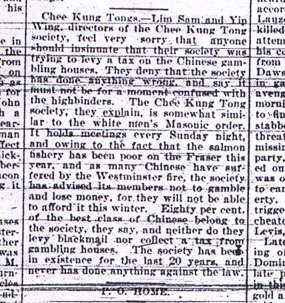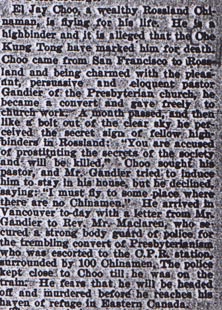What do the Papers Say?
This intriguing apologia appeared in the Colonist in late 1898. It's hard to say whether it is an attempt by the paper to portray the CKT in a more favourable light or if it is a public relations exercise instigated by the tong. In some ways, it comes off as a late 19th century "press release."

Daily British Colonist 4 October 1898
Chee Kung Tongs--Lim Sam and Yip Wing, directors of the Chee Kung Tong society, feel very sorry that anyone should insinuate that their society was trying to levy a tax on the Chinese gambling houses. They deny that the society has done anything wrong, and say it must not be for a moment confused with the highbinders. The Chee Kung Tong society, they explain, is somewhat similar to the white men’s Masonic order. It holds meetings every Sunday night, and owing to the fact that the salmon fishery has been poor on the Fraser this year, and as many Chinese have suffered by the Westminster fire, the society has advised its members not to gamble and lose money, for they will not be able to afford it this winter. Eight per cent of the best class of Chinese belong to the society, they say, and neither do they levy blackmail nor collect a tax from gambling houses. The society has been in existence for the last 20 years, and never has done anything against the law.
Just shy of a couple of months later (1 December 1898), however, the Colonist reported on this incident involving a Chinese national from the Kootenays:

El Jay Choo, a wealthy Rossland
Chinaman, is flying for his life. He is a highbinder and it is
alleged that the Chee Kung Tong have marked him for death. Choo came from San
Francisco to Rossland and being charmed with the pleasant,
persuasive and eloquent pastor Gandier of
the Presbyterian Church, he became a convert and gave freely to
church work. A month passed, and then like a bolt of the clear sky
he perceived the secret sign of fellow highbinders in Rossland: “You are accused of prostituting
the secrets of the society and will be killed.” Choo sought his pastor, and Mr. Gandier tried to induce him to stay in the house,
but he declined, saying: “I must fly to some place where there are
no Chinamen.” He arrived in Vancouver to-day with
a letter from Mr. Gandier to Rev. Mr. Maclaren, who secured a strong body guard
of police for the trembling convert of Presbyterianism who was
escorted to the C.P.R. station, surrounded by 100 Chinamen. The
police kept close to Choo till he was
on the train. He fears that he will be headed off and murdered before he
reaches his haven of refuge in Eastern
Canada.
The real Chee Kung Tong of the Victorian era will probably never get a chance to stand up, but it seems likely, given the nature of newspaper reporting of the day, that a lot of the stories of tongs were sensationalised (like much of the news of the day) in an attempt to sell more newspapers. The fact that the above story stated that the CKT is "alleged" to have marked Mr. Choo for death gave the Colonist an "out" in the event that the information was proven unverifiable. The newspaper was probably also counting on a limited knowledge of English on the part of the subjects of the stories to forestall any complaints of falsehoods they read!
